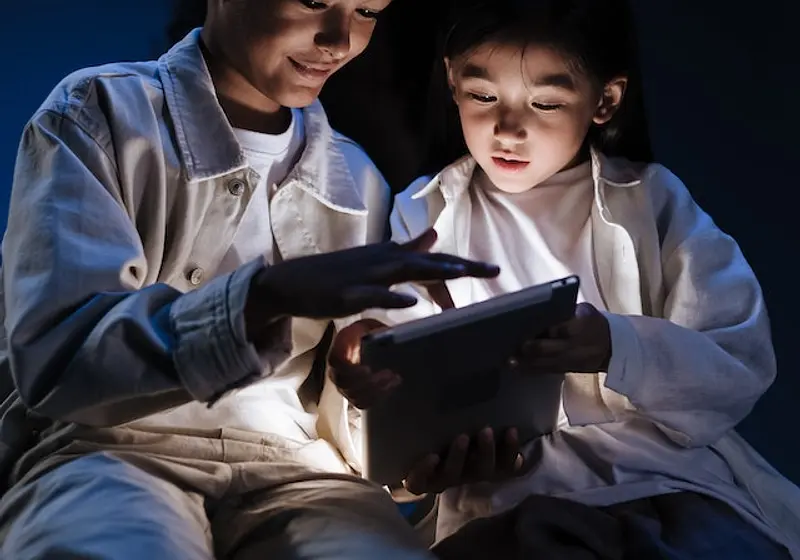Introduction
I'm sure we've all heard of the saying, "Smartphones turn your brain into mush." However, recent years have shown a steady rise in children utilizing electronic devices. This phenomenon has resulted in different connotations attached to those who consume social media content excessively. The most prevalent include "iPad Kids" and "Screenagers."
This article highlights the effects of how youngster's brains are impacted by and the derogatory effects of social media use.
Let us slide into your dms 🥰
Get notified of top trending articles like this one every week! (we won't spam you)The advent of the "iPad Kid."
As the name suggests, the term "iPad Kid" refers to a child below nine who rarely has an iPad. An iPad Kid is characterized by a child who barely leaves the house. The entirety of an iPad Kids' world exists online, usually in games or social media applications. Children termed iPad kids are associated with awkward social movements and "addict-like" behaviors.
The Collins Dictionary defines a "screenager" as a person in their teens or early twenties who has an aptitude for computers and spends a lot of time on the internet. However, the term has also grown to include a specific set of people who are always on their phones as you try to converse with them.
To give you a typical example of what "addict-like" behavior is, let's look at the following scenario. Parents often cannot understand their children's behavior when their iPads or electronic gadgets are taken away. Children were reported to throw tantrums, scream, yell, or kick until their device was returned to them. iPad kids and screenagers experience extreme withdrawal symptoms when they're forced to make do without their devices.
The side effects of screen exposure at such a young age aren't just limited to addict-like behavior. In fact, 70% of parents admit to their children experiencing an inability to form genuine social relationships and facing immense difficulty in doing so.
It's important to realize that the problem isn't social media. It's the irrational consumption of it. This isn't just a tiny interest in social media. This is curiosity gone too far.

Take the Quiz: Discover Your Ideal Stress-Relieving Hobby
Everyone deals with stress differently, and finding the right hobby can help you relax and unwind. Take this quiz to find out which stress-relievin...
Frontal Lobes and Therapy
According to a UK communications regulator report, an astounding 16% of toddlers watch videos on TikTok. The statistic isn't just shocking. It's harmful.
While social media can provide toddlers with a vast expanse of educational content, it's important to note the dangers of the algorithm. Social media platforms are essentially designed to maximize user engagement, with the algorithm recommending content based on your previous watch history. The construction of social media algorithms, along with their lack of filtering in the content shown to whosoever is behind the screen, has proven to have more than just a negative impact.
It's a positively detrimental one. Autoplay, endless scroll, and push notifications don't just increase interaction. They're vital to the usage of the platform.
These can lead to toddlers being exposed to explicit content shown on some platforms. Types of content shown range far and beyond; depictions of self-harm and cutting are widespread on multiple platforms. Engaging with content like this at an age where the mind is barely developing has and does induce similar behavior.
An article by The Telegraph illustrates how screen addiction in toddlers has gone so far that four-year-olds now require therapy. A YouTube video by NBC News shows that excessive use of social media, especially at a developing age, can have obstructive effects. Children using social media instead of interacting with friends their age can lead to a stunted development of the brain's frontal lobe.
An advisory and body dysmorphia
In May 2023, Surgeon General Vivek Murthy noted in a 19-page advisory the potential harms of social media use amongst children and adolescents. A systematic review of 42 studies on the effects of excessive social media use, as highlighted in the advisory, found a consistent relationship between social media use, poor sleep quality, and depression among youth. This brings to mind the phrase "FOMO."
FOMO is an abbreviated form of the phrase "Fear of Missing Out." Uncontrolled use of social media often leads teenagers to believe that their peers are having more rewarding experiences than them. This further increases their feeling of social exclusion and has been associated with neuroticism ( a negative personality trait associated with poor self-regulation and trouble dealing with stress). An older study showed that the longer teenagers used Facebook, the stronger their belief that others were happier than they were. But the more time the students spent going out with their friends, the less they felt this way.
The excessive usage of smartphones, in general, continues to hamper and will hamper, in the future, the abilities of youngsters to develop social skills. After all, humans are social animals. Overtime usage of social media doesn't just hamper this skill. It positively reduces the chances of social skills developing to zero.
The effects of social media aren't just limited to social interaction. The digital world is crucial in how a mere child views oneself. And the self-image developed by chronically online users isn't pretty.
Social media has been found to fuel body dysmorphia, disordered eating, and body dissatisfaction. On platforms like X, entire communities dedicated to adolescent girls starving their bodies to attain so-called "ideal" body standards exist to this day.
Multiple studies, including one by The International Journal of Eating Disorders, have indicated a crucial relationship between social media use and negative perceptions about one's own body. When asked about the impact of social media on their body image, nearly half (46%) of adolescents aged 13–17 said social media makes them feel worse. This starkly contrasts the 14% who said it makes them feel "better."
Closing the Tabs
A toddler's mind is similar to that of a sponge. A sponge tends to soak in water or any available liquid, and so do toddlers. Since children do not have a choice in how they emotionally regulate themselves or develop habits, the responsibility falls on the parents.
While technology has immensely impacted how we live our lives, excessive usage of technology should not be a substitute for going out on walks and for a child's natural development. Studies showing life-threatening consequences of overexposure to social media at a young age should be taken at face value.
The choice is ours- to close the tab or open another one.



.jpeg)
.jpeg)







